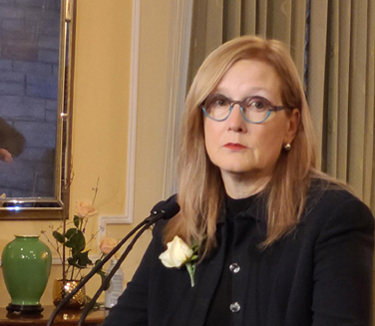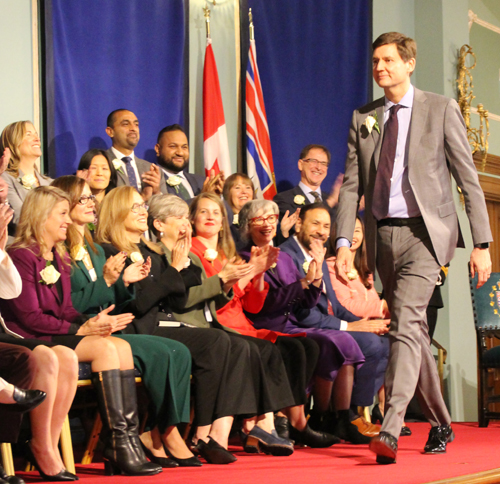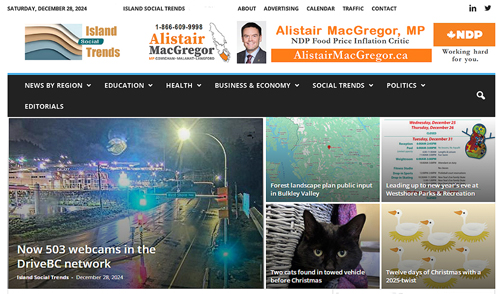Monday December 30, 2024 | VICTORIA, BC
Political analysis by Mary P Brooke | Island Social Trends
“Eligible people will get some help with their holiday bills with benefits and credits arriving in the new year,” says the BC finance ministry in a news release today.
Neither of the credits is new — and neither is targeted or earmarked in any way to “help with holiday bills”.
But the BC government is promoting them ahead of the new year as a way to remind low-to-middle income residents about the ongoing supports that the BC NDP government facilitates.
Many of the benefits and tax credits are automatically sent to eligible people if they have filed their income taxes.
- The quarterly climate action tax credit has for years been delivered quarterly combined with any federal GST tax credits that people are eligible for., via the Canada Revenue Agency (appearing on bank statements as payments from the Government of Canada).
- The BC Family Benefit payment has also been in effect for years, for eligible households.
BC Finance Minister comment:
“I know the high cost of living can cause pressure for so many people during the holiday season,” says Minister of Finance Brenda Bailey in a news release today.

“While high prices persist across the country and around the world, we are working hard to help offset costs for people in B.C. with tax credits that put more money into people’s pockets when they need it most,” she stated — a message she has delivered since day one on the job.
Bailey was appointed Finance Minister on November 18 of this year, as part of the new BC cabinet swearing-in.
Missing some political sensibility:
Sometimes it’s best not to brag. And it’s always important for governments to stay in touch with the temperament of the populations they serve.
While these tax credits clearly help struggling households and families in BC — and good on the BC NDP government for having these in place — it’s these sorts of supports that eventually led to some political pushback from middle-income and higher-earning households who have complained over the years that they are not being helped by government during tough economic times. This angst, in part, has fueled conservative pushback in politics both federally and provincially.
The federal government recently launched their controversial two-month GST tax holiday (December 14, 2024 to February 15, 2025) as a way to stave off that area of criticism — but it hasn’t worked. Burdensome POS adjustments and bookkeeping fell upon businesses, likely not leading to any political vote gain. Also, people who are struggling month-to-month likely didn’t benefit much from the federal GST tax holiday — one needs to have disposable income in order to benefit in any substantial way.
Post-pandemic, the long-deepening socioeconomic class divide in BC (arguably digging in over a 40-year period of globalization and financialization of the economy) is possibly worse than ever. And in light of the raw response to the GST tax holiday, one wonders about the political sensibilities of the BC government promoting not-new tax credits.
The BC government would have been smarter not to promote the availability of credits at this time. Most people who are eligible are already receiving the supports, which in itself is a remarkable achievement of government service delivery.
A broad open reminder of socioeconomic class divide is probably not politically helpful at this time. The Premier and his government need to find better ways to promote their successes without stirring political ire. Perhaps a direct email to recipients might have been a better approach under current political conditions, to underscore how the BC government is working hard t support people.
How the credits are delivered:
Delivery details:
- Quarterly GST/Climate Action Tax Credit: The quarterly climate action tax credit payments are expected to arrive in bank accounts on or around Friday, January 3, 2025. Approximately 65% of families and individuals in B.C. receive money through this credit. The average annual credit is an estimated $440 for individuals with no dependent children, $680 for single-parent families and $613 for multi-parent families.
- BC Family Benefit: Later in January 2025, more than 340,000 families with lower or middle incomes can count on their BC Family Benefit payment, now with a temporary cost-of-living bonus. The 25% increase means an average of $445 more a year for families. A family of four can receive as much as $3,563 a year, while a single parent with one child can receive as much as $2,688 per year. The family benefit is deposited in bank accounts around the 20th of each month.
Other provincial benefits:
The Province states in their news release today that BC NDP government is “working in other ways to help people with costs”, such as:
- minimum wage increases;
- lower car-insurance costs;
- reduced child care fees;
- free prescription birth control;
- free transit for kids;
- capping rent increases to inflation; and
- through a new tax credit, returning as much as $400 a year to 75% of people who rent in B.C.
People can find out how to access provincial government benefits and savings programs on the BC Benefits Connector, which is available online.
Delivery through CRA:
Income-tax filing is necessary in order to be in the Canada Revenue Agency (CRA) system. The payments from the B.C. government are delivered on the Province’s behalf by the Canada Revenue Agency; they appear on bank statements as payments from the Government of Canada.
Worried about mail delays? If you have not already, you can sign up with the Canada Revenue Agency to get benefits and credits deposited automatically into your bank account.
Beware of fraud:
The B.C. government will not contact you about tax credits, rebates or benefits by text message. If you receive a text, it may be fraud. If unsure, email: ITBTaxQuestions@gov.bc.ca
===== RELATED:
NEWS SECTIONS: POLITICS | BUSINESS & ECONOMY










